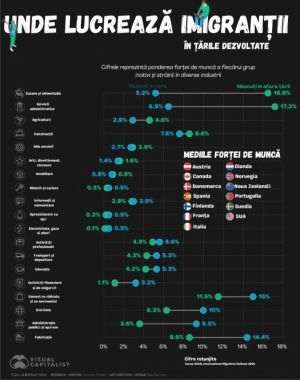Reporter: What do you view Romania like, from a political and economic point of view, when you come back?
Mike Borze: In terms of the political level in Romania, I am ashamed of its quality. It is a waste of time and a cause of moral degradation to listen to the discussions of Romanian politicians. It is embarrassing. It's been about four years since I've stopped turning on the TV, to avoid wasting time. I would rather read something. On a political level I know little and I have little interest. When it comes to politicians, I have quite enough contact with them, because every time politicians come to Vienna, the ambassador calls me to tell me: "Mr. Varujan Vosganian is coming in, we have to meet. Mrs. Udrea is coming in, we have to eat together", and so on. I've become picky and I rarely go to meetings with politicians, because generally, whenever I deal with a politician, regardless of their nationality, the first thing I do with their business card is throw it in the trash. It's not worth replying to any politician's email. I have yet to meet one that is worth writing to and spending time talking to them. It serves no purpose.
From an economic point of view, sure I look at the business sector factors that interest me. Not necessarily because I like what I see, but a situation of crisis is always an opportunity, and it must be used.
Reporter: How is Romania's market viewed at BenQ Europe? Are the Westerners wary of it?
Mike Borze: My colleagues in other countries aren't allowed to comment on how I manage my business. None of them has the right to comment on my management or to ask why we take certain actions. Sure, we do meet and conduct certain common analyses, where we talk, behind closed doors, among ourselves, if, for instance, a country has weaker results. We meet the manager in question, we listen to his proposals and we decide together what needs to be done. We will find solutions together. But these interventions only happen in extreme cases. I am the head over Eastern Europe and France, things are going well, but even if they didn't, it would be hard for my colleagues, who are all of them younger than me, to come and ask me why and how I did something.
Reporter: The banking system is not doing so well. Does BenQ work with banks?
Mike Borze: We don't work with banks, we have taken no money from banks, no loans, not one cent. We don't have any interest to pay or anything like that, the problem is that I have money in my account and I'm not getting anything for it. People need to realize that they shouldn't consume what they don't have. If I go to the store and I have to pay, but I don't have any money, they won't give me anything. People spend two times, three times, four times, or in some countries even ten times what they have. These past few months, the people from the ratings firms were saying that if America doesn't raise its debt ceiling, by who knows how many hundred billions, or thousand billions, their AAA rating will get cut. It's an anomaly, because the more cash you have and the less debt you have, it is healthier. How can you keep your AAA rating if you have debt? It is a nonsense, this is where the rottenness of the system lies. For example, Austria, which is a rich country, could have covered its debt in five years, Also, we pay 10 billion Euros in debt to the banks. With ten billion you are going to build thousands of kilometers of highways, thousands of schools, anything you want. There is huge potential, but it all goes through your fingers, to the banks. It's still the people who steal who make the profit.
Reporter: What is your take on the "bail-in" measure in the banking system, to save distressed banks using the depositors' money?
Mike Borze: You don't have to have over 100,000 Euros, because there are over 30 banks in Austria. You just deposit 100,000 in each and that's it. This regulation can be easily circumvented. I don't think it will apply to companies, because the state can't guarantee companies' money. It is once again a diabolical attempt by politicians, to use other people's money for themselves. They all want to amass money for themselves, they have no interest in helping people. It has nothing to do with helping others, just like the American invasion had nothing to do with Iraq. They didn't care for Saddam Hussein, they cared for the oil they could find over there. Nothing gets done nowadays out of the kindness of the heart. It is all pure interest. The end goal is money.
Reporter: When and how do you think this global digital revolution will end?
Mike Borze: Just like the CD-ROM has a physical limitation when it comes to how fast it can spin, so it is with the human psyche. People will say "I don't want a phone anymore, I don't want internet, I've had enough. I don't need anything anymore, I've had enough". An increasing number of people are beginning to think like that. The current generation is becoming digital native, they are born digital, they are semi-robots. I was talking to my younger daughter, because every now and then I check the messages she gets. She's come to the point where she gets 100 messages an hour. After digital-native comes a disease: digital madness. Is what awaits us. This will hurt companies in the business. People have come to the point where they buy anything that is new on the market, even if they don't need it. I try to stay as far away as possible from phones, for instance. The virtual has replaced the real, the world is no longer real, but virtual. I was talking to some children and they were telling me they had 1,500 friends on Facebook. I told them that instead of having 4-5 real life friends, they keep wasting their time like fools in a virtual environment, where 1450 of those friends they don't know. It's a dead conversation, pointless, just to be cool.
I am completely against everything that means Facebook and social network. They all distance you from people, none of them cause you to socialize. All of them are the last thing I want. Didn't you see that all the conflicts in Northern Africa have been virtual? A few bombs, and other than that, everything is virtual. We already have a very intense psychological war. I am totally against them, but I work in an industry that facilitates them, and I will probably leave it before it's too late.
Reporter: When do you think that time will come?
Mike Borze: It probably won't be more than five years before people come to the conclusion that they need to return to real life. To me, the five year period means stepping away from everything that is digital. I've been working in this sector all my life, I've even graduated in computer science. People will realize this 5-10 years from now. In Korea for instance, where there are classes where they only use notebooks, tablets, children don't know how to write anymore. We are becoming digital illiterates. When this generation comes into power, it be all over. What are you going to do with them if the power shuts down? This virtual future is not bright all. I am used to being different, to swim against the tide.
Reporter: How has the crisis in Ukraine affect your European business?
Mike Borze: Had that crisis in Ukraine not happened, we would have already been in a turn-around. The slope of the curve would have been reversed. Until now, it was pointing down, but in the third and fourth quarter of 2013, it has begun going up. This foolishness in Ukraine has caused markets to become unstable. People have become redundant, they are thinking much more before they act. In the end it's not about Crimea, with or without it, Russia isn't any richer, nor is Ukraine any poorer. It's about the natural gas in Russia. At any rate, the thing is that Western Europe, Germany, relies 80% on the natural gas over there. Or, Germany can never take any action against Russia, not even if they were to invade the whole of Ukraine. Germany doesn't have any alternative to Russia's natural gas, for now. We are on the threshold of the third world war, which will not be military, but economic and psychological.
Reporter: What was this company's best year so far?
Mike Borze: The best European year was 2007, and after the crisis, 2011 was once again a good year, in 2013 we have grown, 2014 started off very well. Had this Ukrainian problem not existed, 2014 would have seen a growth of 20 - 30% in Eastern Europe. As it is, we will now have to settle for 10-15%. Sure, we are going to lose 5-10 percent just because of Ukraine. I think that we, amid a contraction in the market over the last few years, have managed to grow. That means that we are doing something better than the competition. Having 50% of the projector market means something. I want to be in the top 3, with all the products, in every country. When you are there, you have a certain consolidated position, and this is generally valid all over the world. We have used the crisis as an opportunity and I think that we have used it well. Romania, with 50%, is the second largest country after Lithuania din terms of the market share in Eastern Europe. Overall, considering the situation it is in, Romania has done well. Poland and Czech Republic are the engines that are roaring. Romania constantly ranks third or fourth. Ukraine is lost, at least this year.
Reporter: Do you have any plans to expand the range of products to other territories?
Mike Borze: All the products that we've brought to Europe are also available in Romania. Everything that is in the warehouse in Holland, comes here as well, regardless of the product. In terms of territories, there is no major country where we are not present in the world, and even in Europe, a change may come which would make available to us another country that will join Europe. It is pointless to withdraw from anywhere. As long as there is business and demand, why withdraw? In Ukraine there will be a lower turnover than there was, but that doesn't mean we should withdraw from there.
Reporter: What types of products have begun showing problems when it comes to sales?
Mike Borze: Digital cameras are dead, with a drop of 30-40%, what are you going to do with them when everyone has X megapixels on their phones and tablets? I don't even carry a camera with me, I've got ten at home. On my phone I have 10 megapixels and I carry it with me all the time. On the other hand, you can't replace a laptop with a tablet, they are two different things. I think that they will continue to exist and they have to.
Reporter: What do you think are the weaknesses of BenQ?
Mike Borze: The weakness is, of course, the lack of guts of some of my colleagues in Western Europe, that delays the introduction of new products. Meaning that, if a product can't be sold in England, France, Germany, the major countries in general, it is very difficult to bring it to one or two countries in Eastern Europe. If the people in the West were more active, more aggressive, it would be easier for us. Our colleagues in the West are too complacent. I've tried to give them a push over the last few years, so we can bring in more major products: laptops and tablets, TV sets, smartphones. If we captured 1% of the market share on a European level for one of these three products, that would add 1 billion Euros to the turnover, every year. I find it hard to understand why they are so hesitant. This is my war and I hope that at least next year, we will bring a new line of major products to the market.





























































